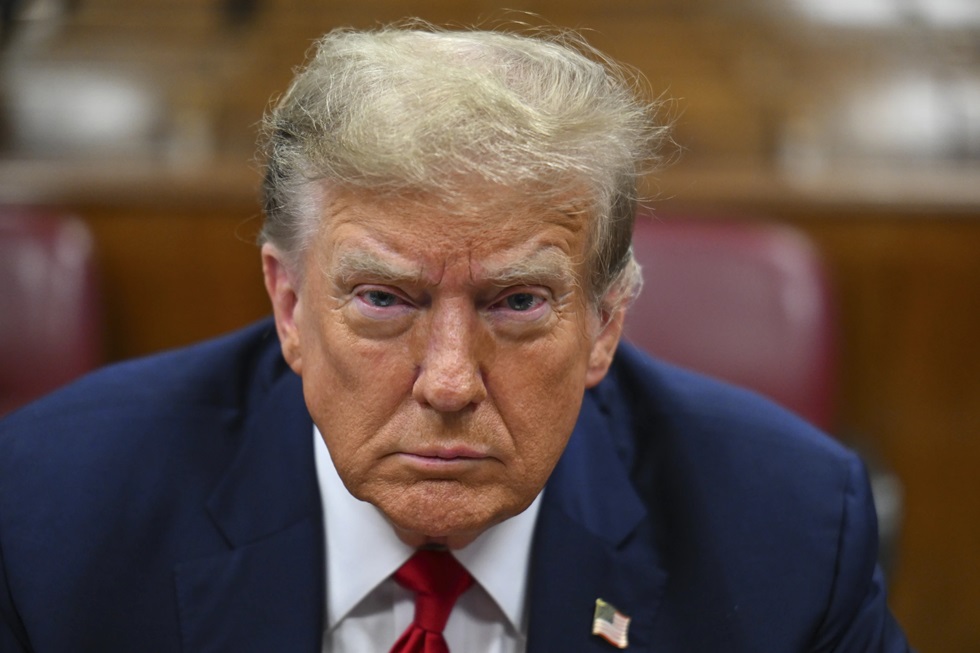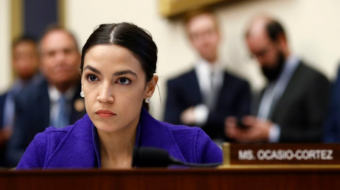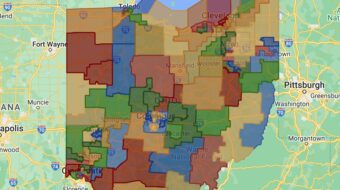
NEW YORK—A trial of Donald Trump opens on April 15, for real, on a criminal cover-up. And it’s not a trial the Republican presidential nominee can stall all the way through this fall’s election. Nor is it one he can squash even if, God forbid, he re-enters the White House this January.
That’s because Trump faces a 34-count state felony indictment, in New York State Supreme Court, that alleges the former president falsified business records to hide damaging information in the weeks preceding the 2016 presidential election.
And state charges, unlike federal indictments, can’t be tossed out by Trump toadies in the Justice Department even if the former real estate mogul re-enters the White House in January.
Trump would have done well to heed Richard Nixon, the prior Republican president to face impeachment—but who quit before he lost the Watergate case almost 50 years ago—when he said, “It’s not the crime that gets you, it’s the cover-up.”
This trial, the first-ever of a president or former president on criminal charges, however, is important for a key reason. It’s the only Trump trial, that, as timelines now stand, begins and will probably end before Election Day. Jury selection, which could take two weeks, starts today, with the trial itself expected to last six to eight weeks.
And a convicted Trump could lose half of Republican voters, the latest opinion poll on the issue, released on Valentine’s Day, shows.
There is no precedent for trying a former president on criminal charges. But the deputy Watergate prosecutors of Nixon wanted to try him criminally, too. That trial, though, was in federal court in D.C., and Republican President Gerald Ford’s controversial pardon ended that trial possibility.
Ford said Nixon had suffered enough without having to go through a trial. After Ford’s pardon Nixon retired to a seaside mansion where he continued his “suffering” in California. After a stint at being America’s dictator Trump too would like to retire to “suffer” at his seaside mansion in Florida. While criminal ex-presidents suffer their punishment at seaside mansions, most of the rest of us do that behind bars.
Others would already be jailed
Anyone else having committed crimes on the level of Nixon and Trump would now be in jail. There is indeed a double standard of justice in America but not one that persecutes the Nixons and the Trumps, as they claim, but one that treats them with kid gloves while it treats the rest of us much more harshly.
With appeals in this hush-money cover-up case, if he’s convicted, Trump could delay sentencing, fines and/or going to jail until well into next year, if not beyond. But unlike the federal cases, he can’t avoid them by dropping prosecution or pardoning himself.
The trial of Trump in Manhattan is not about just the hush money but about covering up that transaction and his intent to influence the outcome of an election with that transaction and about his actual violation of campaign finance laws by carrying out that transaction.
Trump covered up a $130,000 hush money payment to stripper Stormy McDaniels. He also paid a $150,000 “kill fee” to former Playboy model Karen McDougal, via the National Enquirer. The cover-up was to hide his prior affairs with the two women from being disclosed during his presidential election campaign eight years ago. Trump characterized them as “legal fees” and thus as business expenses.
The characterization itself is a misdemeanor under New York law, but Manhattan District Attorney Alvin Bragg and his assistants, who are trying the case before State Supreme Court Justice Juan Merchan, raised each count to a Class E felony. The McDaniels check is the center of the case.
Class E felonies carry sentences of 1.5-4 years in New York State prison and 1.2-3 years post-release supervision upon conviction, according to a digest of the state legal code. The digest is silent on whether the sentences can be consecutive, rather than concurrent. They also carry a $5000 fine per count upon conviction.
The charges say Trump signed the checks and approved the payments, through his lawyer-fixer Michael Cohen, with an “intent to defraud” and an intent to “commit another crime or to aid or conceal” another crime—the hush money.
Cohen’s reimbursements to the two women were falsely reported in financial records by the Trump Organization, the family company, as legal fees. They really were illegal campaign expenses, breaking state campaign finance contribution limits, to shut the two up.
Cohen is expected to be Bragg’s star witness. He’s already pled guilty to lying about the payments, including lying to Congress.
Trump will try to turn this trial, as he has others, into a three-ring circus of accusations, threats, outrage, insults and outright lies, as a way to keep the spotlight on him, his grievances and his campaign—especially since he’s relying on his donors, large and small, to pay his legal fees. He’s already started the bile and the lies on his so-called Truth Social internet feed.
But his campaign of bile has run up against Justice Merchan, who has already shown little tolerance for histrionics in his courtroom. The justice told Associated Press in a pre-trial interview that he intends to pilot a tight ship. The judge already imposed one gag order on Trump and expanded it in early April to cover threats to family members of court personnel, including the judge’s own daughter.
The trial will also throw cold water on Trump’s presidential bid, even if he’s already clenched the Republican nomination. Unlike civil cases, such as the one New York Attorney General Letitia “Tish” James brought, also in State Supreme Court, for massive tax fraud, criminal defendants must attend all court sessions.
Picked and chose
Trump picked and chose which sessions in the tax fraud trial to attend, and then trumpeted his lies on the corridors and sidewalks outside the courtroom. This time, he’ll have to sit and listen, day after day, just like any other criminal defendant.
Trump’s also up against the fact that a significant slice of the electorate, including Republicans, say now they would vote against a presidential hopeful who, if convicted, could be serving time in the Sing Sing state penitentiary when the election rolls around.
A Reuters/IPSOS survey for Newsweek in early February found “55% of potential voters would not support the anticipated Republican nominee at the general election if he were convicted of any of the 91 felony charges he has pleaded not guilty to across four criminal trials,” including this New York trial and trials in D.C., Georgia and Florida.
That includes 51% of Republicans, surveyors found. They talked with 1237 registered voters just before Valentine’s Day. The poll has a plus-or-minus 2.9% margin of error.
And “58% said they would not vote for Trump if he were serving time in prison in November.” This New York trial, just on a timetable base, is the only one with that possibility looming.
The other trials, including another state trial in Georgia, on trying to steal the swing state’s electoral votes, are stalled by legal maneuvers by Trump’s lawyers.
The D.C. trial, on charges Trump conspired to defraud voters of their rights by his aiding, abetting and ordering the insurrection at the U.S. Capitol three years ago, is stalled by Trump’s claim to the U.S. Supreme Court that he has perpetual immunity from criminal prosecution even after leaving the White House, because he was president. The justices will hear that case on April 22.
That immunity claim’s also delaying the Florida trial on Trump’s purloined White House secret papers. So is the federal judge, a Trump appointee.
In New York, Trump’s lawyers tried to stall or toss the hush money trial by flourishing a poll showing Trump can’t get a fair trial in Manhattan, where the jurors will come from. Justice Merchan rejected that, too.
While half of Republican voters now say they would desert a convicted Trump, Republican donors are another matter.
OpenSecrets.org reports Trump’s own campaign committee has raised $96 million and the SuperPAC associated with Trump has raised $83 million more since the start of this election cycle last year. The top donor is McMahon Ventures, the firm that owns the World Wrestling Federation. While in the White House, Trump appointed Linda McMahon, wife of WWF owner Vince McMahon, a GOP big giver, to head the U.S. Small Business Administration.
Two other firms, Hendricks Holding Company and Crownquest Operating, kicked in more than $5 million each. Nine more donors, including the majority owner of the New York Jets pro football team, shelled out at least million dollars apiece.
We hope you appreciated this article. At People’s World, we believe news and information should be free and accessible to all, but we need your help. Our journalism is free of corporate influence and paywalls because we are totally reader-supported. Only you, our readers and supporters, make this possible. If you enjoy reading People’s World and the stories we bring you, please support our work by donating or becoming a monthly sustainer today. Thank you!












Comments